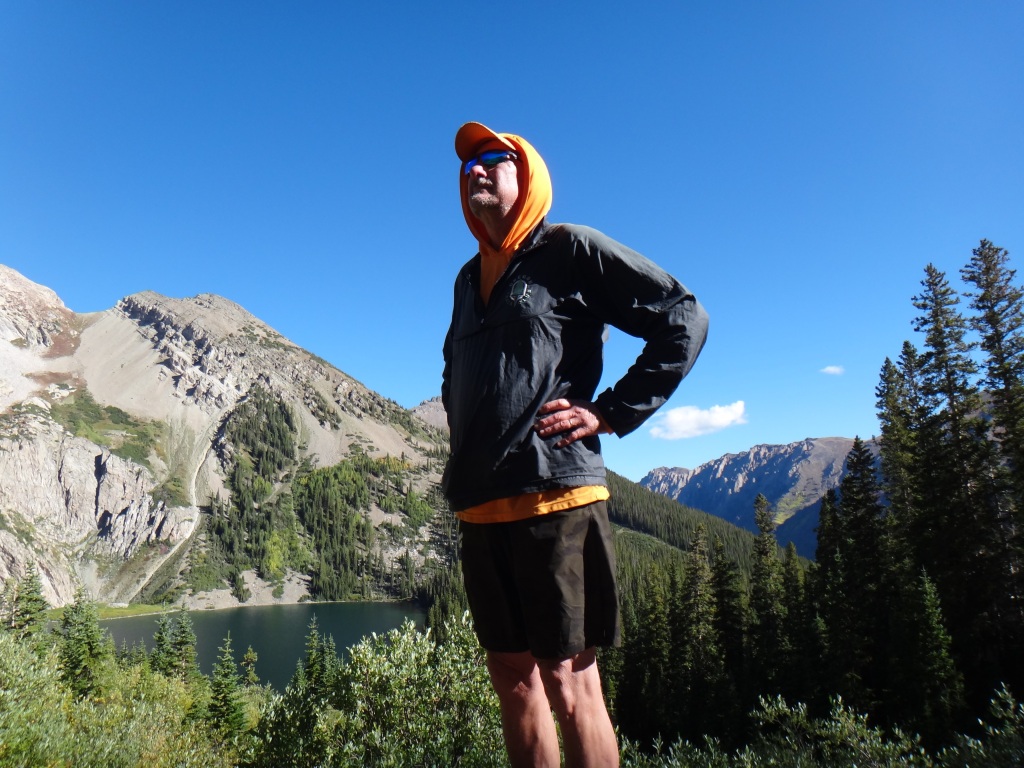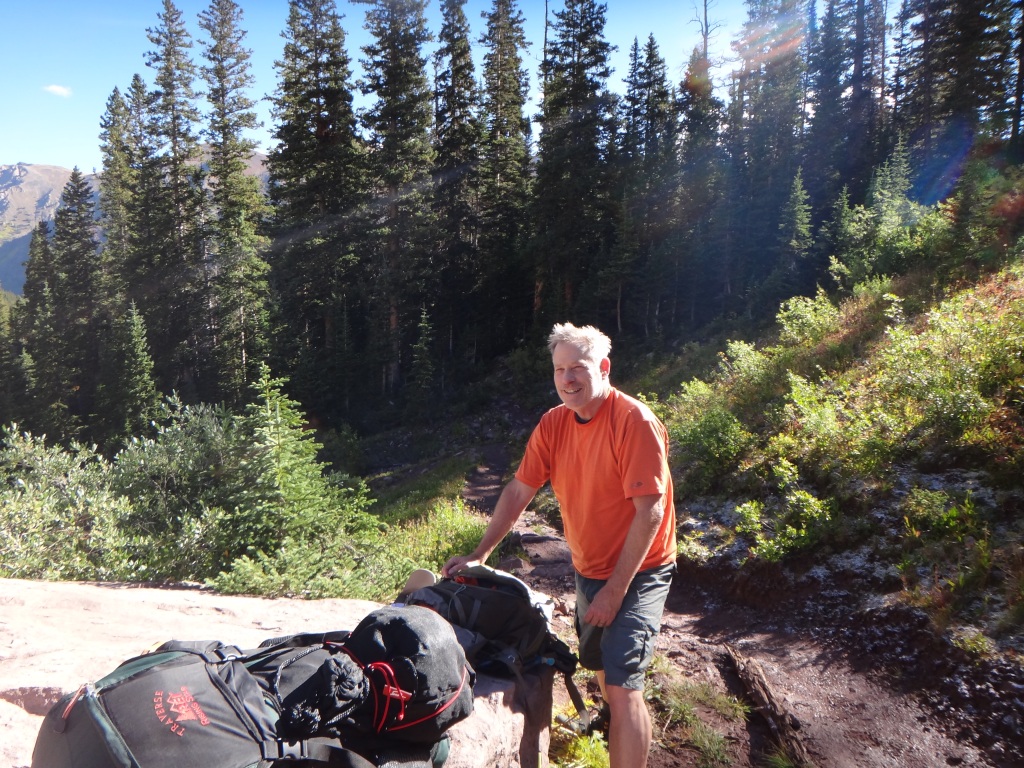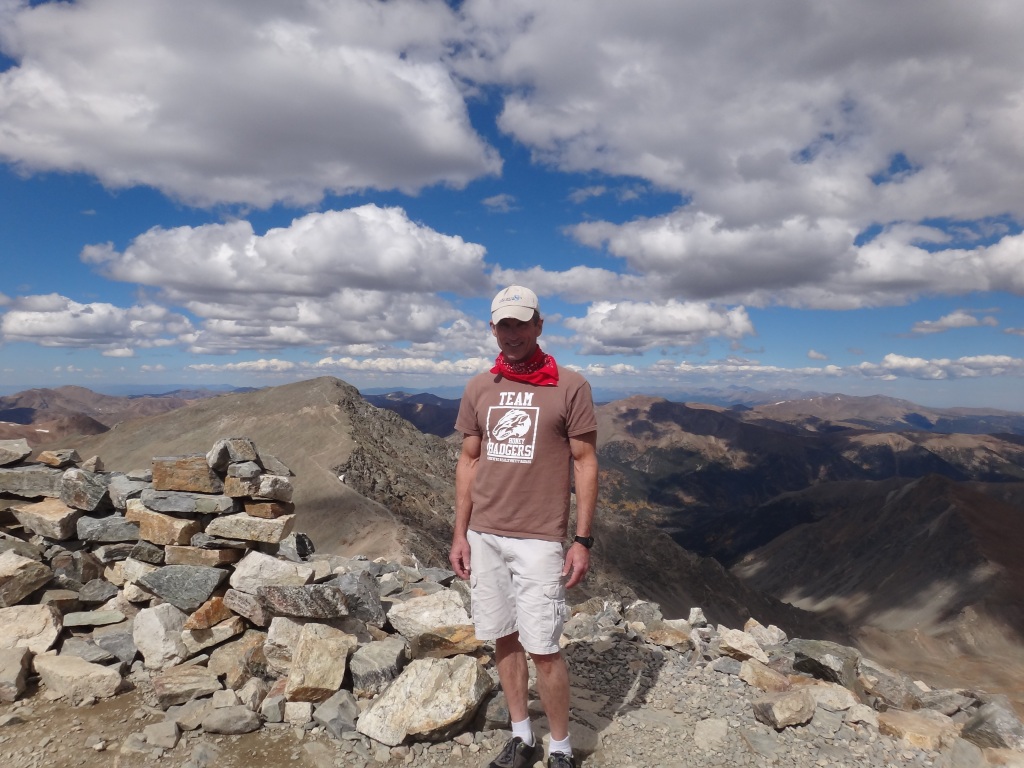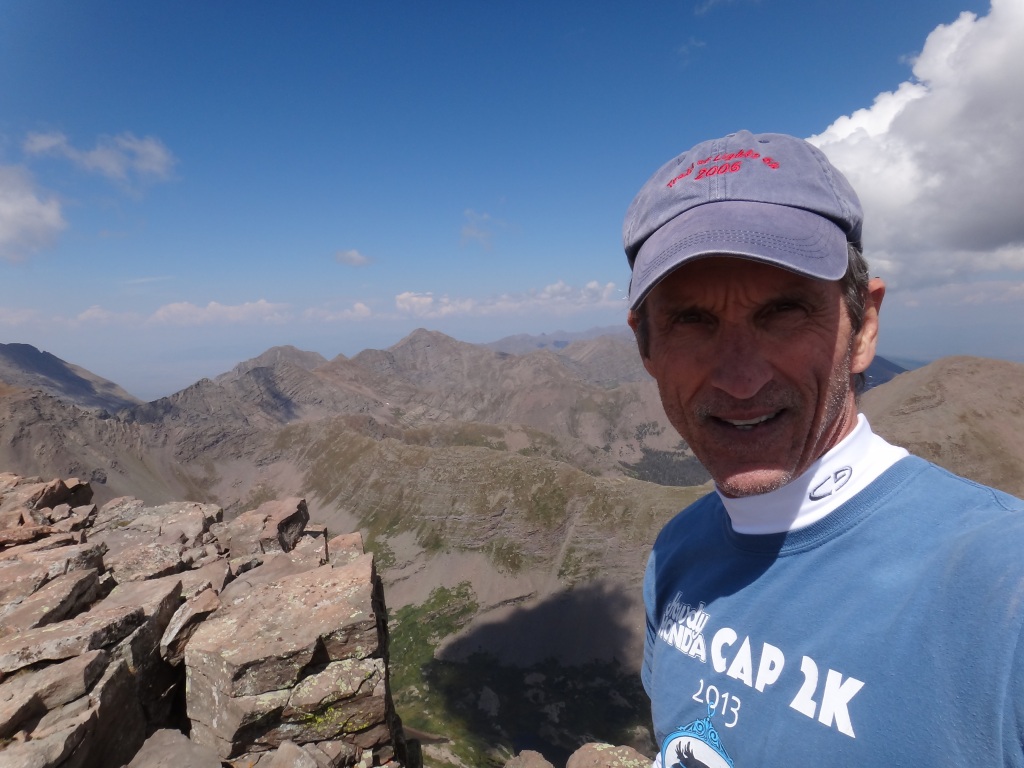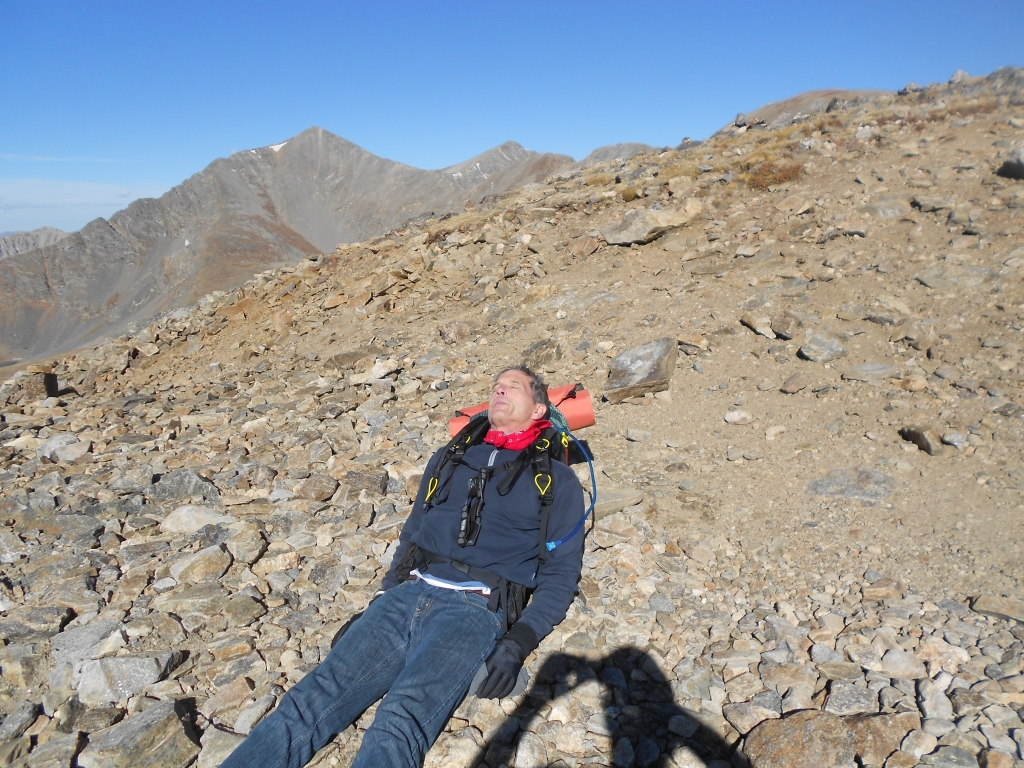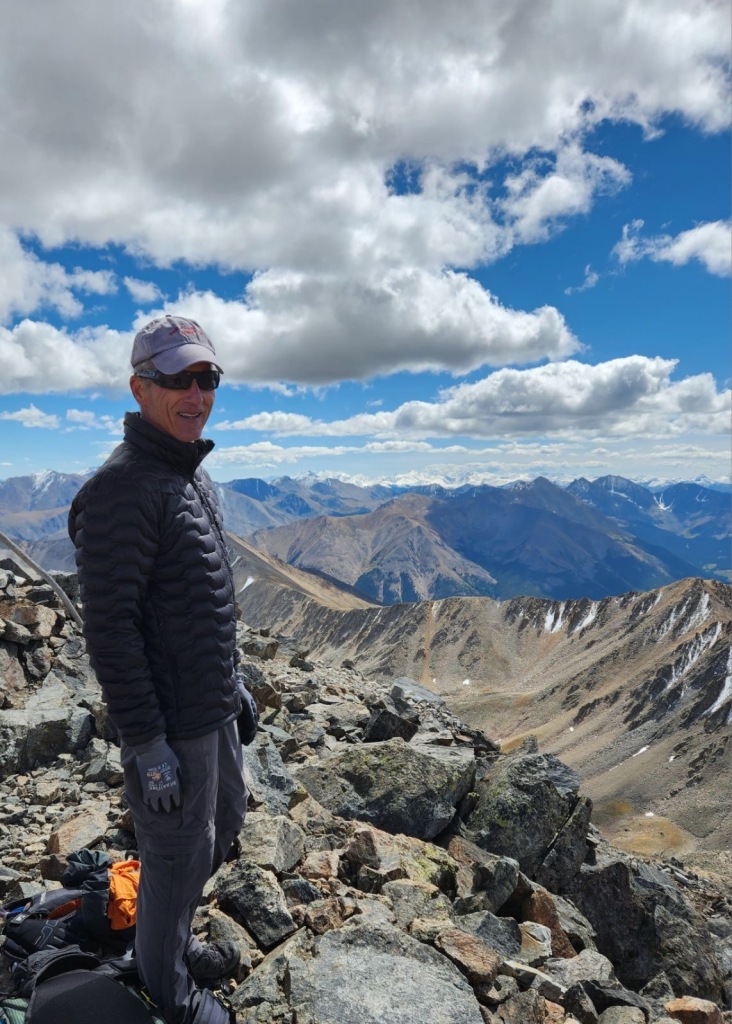We were working our way up the switchbacks to the top of Trailrider Pass in the Maroon Bells Wilderness when Ed yelled “hey George, did you see the legs on that girl wearing the bootyshorts!?” The young woman wearing the “bootyshorts” was part of a group above us working their way down the switchbacks from the top of the pass, and it is the nature of switchbacks that two approaching groups headed opposite directions are never far from each other horizontally, and get closer to each other vertically as they progress. The girl in the bootyshorts was perhaps 10 feet away from us when Ed yelled his question/compliment.
Ed’s got this thing about Colorado mountain-women and their “quads of steel.” I asked him later, “Ed, do you realize you were really close to that girl when you yelled about her legs and her bootyshorts?” He gave me an innocent-puppy look and asked just a little too loudly “do you think they heard me?” The whole mountainside heard him, but the girl, like me and everyone else present, pretended to not have heard, and I understood that grandpa Ed was losing his hearing and hadn’t known he was yelling.
We did pretty well this trip. There are a LOT of rules to conform to if you want to hike Maroon Bells, a lot of hoops to jump through, but at the end Rob said “this has been the perfect trip,” and Ed repeated several times “I haven’t been this relaxed in a long time.” But it did not begin that way.
When the idea for this trip first came up, Rob said “I did all the planning last time (a debatable claim about last year’s trip to the Collegiates West), so you guys take care of it and I’ll just go with the flow.” That was fine, but Rob repeated this mantra whenever Ed or I stressed him, which was often. He got curmudgeonly, and he got testy, like a grandpa who’s taken the grandkids for the weekend and has too-late realized that they are brats. A lot of backpacking is absolutely not like clockwork, and Ed and I did our best to ensure that “like clockwork” never happened. Somewhere in there, I understood that Rob, like Ed and myself, had also passed from young to whatever is next, and I attributed his crankiness to perhaps an enlarged prostate, a badge of honor at our age. He should get that checked out. Ed and I anecdotally explained all about prostrate exams to Rob during the trip, so now you know what three men over 60 talk about around a campfire.

Day 1, we made it to the top of Buckskin Pass, the first of four passes in our loop of Maroon Bells Wilderness. Getting to the top of a pass always feels like an accomplishment–there’s this clear step from one situation to another, something you’ve worked hard for and now there’s this new potential opening before you. You want to sit there at the top and look back at what you’ve just come up, which is weird because you already know what it looks like. I guess you need to hold on to the past a bit. But the moment we crested the pass, it started to sleet and rain. We were so happy to be there, but also knew that a mountain pass is not the place to be if the weather is going to go bad. We threw on our bad weather gear, and got the hell out of there, down the other side and toward whatever came next.
We could have stayed up there, could have felt the storm, which was actually short-lived and wouldn’t have been dangerous, but we didn’t know that then. One of the best things about backpacking is feeling an intimacy with forces we’re more sheltered from now. But we left, almost panicked, to the safety of a lower elevation. That evening, I thought about what I’d missed.

Day 2 was a short hike, just a few miles to Snowmass Lake, which is worth a trip itself. We had time to wander the edges of the far side of the lake, had time to get caught in a storm again. We debated how much of it was snow, how much sleet, how much hail, and this was the beginning of Rob’s attachment to the word “graupel.” I had remarked in earlier conversations that Ed had been using his thesaurus, because he frequently slipped unusual words into a conversation when a simple word would have done, and suddenly Rob became obsessed with defining this wet sleet as “graupel.” But Ed and I doubted the authenticity of Rob’s new word, and were also leery of Rob’s propensity to invent languages. For the duration of the trip, Rob would find a way to use “graupel” in literally every conversation, and the first thing he did when he returned home afterwards was to forward us a dictionary screenshot of the word.
At various points during this trip, things which used to work stopped working. Ed’s Steripen was the first thing to no longer work, and that would have been a problem if Ed had been alone because that’s what he uses to purify his water. Modern backpacking gear is pretty amazing and well-built, so it was surprising that the Steripen gave out but no big deal because Rob and I had our own water purifiers to share.
Then Rob’s stove stopped working. Camp stoves are simple and sturdy, but for some reason when Rob screwed his onto his gas canister, all of his cooking gas just shot out and was gone, forever. If Rob had been alone, that would have been a problem, because just about everything you eat backpacking that is worth eating requires hot water. Plus, you know, coffee. But again, no big deal, because Ed and I had stoves to share.
And then Rob’s water purifying pump gave out. Even Rob couldn’t believe it, and he’s a self-described cynic. This stuff never breaks, and here we’ve lost three important items on a short and relatively easy trip. But no big deal, because luckily we were together.
There are a lot of rules for hiking Maroon Bells. First, you have to get a permit, and there aren’t that many. Then you need a second permit to park your car at the trailhead, also in short supply. Now, you’re not on your way just because you have a permit: Maroon Bells is divided into “zones,” and you need to be in your permitted zone on the right day. There are no lines on the ground or signs indicating that you have crossed from, say, the Upper Snowmass Zone into the Snowmass Lake Zone, and if you have a fear of authority as I do, you’re going to hike in terror of getting caught by a Ranger in the wrong zone. We had six zones to traverse, camping in four of them. We never once saw a Ranger.


Mountain flat space
The Forest Service makes available the above map showing places you could camp within each zone, which I took to mean sites already impacted by camping and so probably also flat and close to water. You’d be surprised how little “flat” there is in the mountains. This map was the source of considerable acrimony on this trip, as it is as close to inaccurate as maps can be made. “Here Be Dragons” on a 16th-century map bad. If you’re planning on hiking Maroon Bells, the Upper Snowmass Zone is particularly fanciful.
You are required to have two kinds of bags to hike Maroon Bells: one is for bears, and the other is for your poop. First, bear bags: an Ursak is a very tough cloth bag that you put your food in and tie to a tree, ideally at least 100 yards from your tent. Bears can’t bite through it, and if you tie the knot right they can’t get it off the tree. Ed kept saying that he felt like all he was doing was putting all of his food into one convenient carrying case for a bear to cart away, but I think he just has no confidence in his knot-tying ability. The other problem is that, as I mentioned earlier, it is hard to find much ideal flat land for a tent, and if you’re putting your bear bag 100 yards away from your tent, you’re probably putting it 5 yards away from someone else’s tent. This happened to us only once, and then we sort of stopped caring because of all the places I have hiked in my life, Maroon Bells is the one spot where I saw exactly zero evidence of bears.
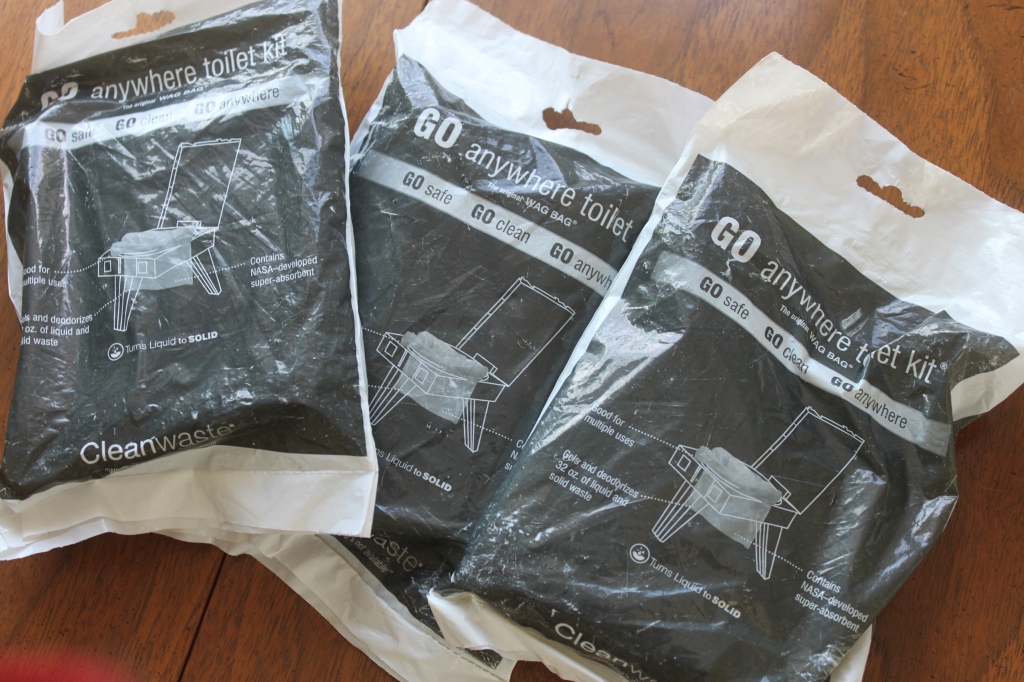
Now, people talk about “shitting in the woods” in various contexts–does a bear do it? But 22,000 people visit Maroon Bells each year, and the Forest Service would really like each of them to take their poop home with them in a WagBag. I’ve never pooped in a bag and carried it home, but I’m a team player and I’ve got my WagBags that I’ve carried and never used for two years now. The fine print on the Forest Service rule says you can still just bury it 6-8 inches deep and pack out your paper, and I think given those options, most of us would decline to carry five days of poop home in their pack. I feel sort of bad about this, but not much.
Somewhere along the North Fork of the Crystal River we ran into two elk hunters. I was surprised that hunting was permitted inside Maroon Bells–there really are quite a few non-game humans hiking back there, and I suddenly regretted being the only large mammal present not wearing bright orange. But our National Forests are a resource for all to share and are well managed, and these two were nice guys. One was from Iowa, the other from Tulsa, and they were resting on their backs with their 60-pound packs still on. My pack weighs about 30 lbs, so I was curious what they’d do if they actually killed an elk. “Well, you leave all your gear here and pack out a quarter. Then you go back and hike out the rest,” which sounded like way too much work for me, especially after being up to your elbows in elk blood and guts. At that exact moment, an elk bugled from the other side of the river, and I said “well, there you go.” They looked at each other and said “naw, that has to be another hunter,” and with that attitude I wasn’t worried about the local elk anymore. Still, Iowa pulled out his elk call, and replied with a pretty good bugle himself although not as realistic as the one from across the river, at which point Rob and Ed and I decided that arrows were going to start flying in several directions soon, and we wished them luck and proceeded quickly on down our trail.

Day 3, Pass 2, Trailrider and the booty shorts, was wonderful. It takes a couple of days out from the trailhead to really feel it, and the three of us paused a good long moment to feel it at the top, looking back. We were looking forward to Day 4, our two-pass day.
At the beginning of our trip we met three Indian couples beginning precisely the route we were hiking, but in the opposite direction. Their equipment looked new and they had a lot of it, but they were enthusiastic and relatively fit and young. There was quite a bit of discussion, because these were intelligent and educated people who insisted that doing the loop clockwise was easier because there was less uphill to hike. We did not want to give offense, or possibly show our own lack of sophistication, but we never figured out how a loop trail that begins and ends in the same spot could do anything but have exactly the same amount of elevation gain as loss.
Day 4 we went up Frigid Air Pass, and I thought frequently about those couples. Frigid Air is absolutely breathtaking, one of the most beautiful passes I’ve been over. Although it was a long climb it was not nearly as long as the descent on the other side, which the couples would have to go up. It seemed to go on without relief forever, and I hate going down. We had crossed the couples again during our hike, and I’m pretty sure that at least one of them is no longer together. Nothing tests relationships like an extended backpacking trip that you’ve told your partner would be easy because you were doing it clockwise.

Ed 
Rob going up Frigid Air Pass 
Pass 2 of our 2-pass day was West Maroon Pass, our last pass of the trip. Coming out of the mountains is always anticlimactic. You’re getting closer to the trailhead, so you’re seeing more people, and the land is more impacted. We found a nice set of brand new tent poles on the trail after the pass that had fallen out of someone’s pack, and I felt really sorry for whoever they belonged to at the end of their day as they stopped to put up their tent. If they were doing the loop clockwise, they had four tentless nights to deal with. I pictured them sitting at the top of a pass, looking back and wondering how their tent poles were doing.
We’re all back home now, getting on with our lives and looking forward I think to next year’s trips, places we’ve always dreamed of but also places we haven’t thought of yet. It’s exciting, and fills you up. I think each of us–Rob, Ed, and myself–hope we’re able to do this stuff forever. But it is really nice, briefly, to pause at the top and look back at what you’ve come from before moving on.
